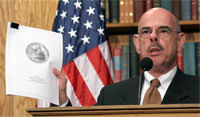The Overseer: Rep. Henry Waxman
Rep. Henry Waxman, who more than any other politician is fulfilling the Democrats' election promise to bring good governance and oversight back to Washington, tells Truthdig about Iraq corruption, the tragedy of post-traumatic stress disorder, and why it's only a matter of time before Congress -- Republicans included -- pulls the plug on the war.
Rep. Henry Waxman, who more than any other politician is fulfilling the Democrats’ election promise to bring good governance and oversight back to Washington, tells Truthdig about Iraq corruption, the tragedy of post-traumatic stress disorder, and why it’s only a matter of time before Congress — Republicans included — pulls the plug on the war.
Click here to listen to this and other interviews.
Transcript:
James Harris:
This is Truthdig. James Harris, here again with Josh Scheer. And we have a special guest on the phone. He is the chairman of the Committee on Oversight and Government Reform. Congressman Henry Waxman has been referred to by some as the Elliot Ness of Democrats. Mr. Waxman, how are you doing today?
Henry Waxman: I’m fine. Pleased to be with you.
Harris: Good. I understand you just got out of the hearing on mental health problems confronting soldiers returning from Iraq and Afghanistan. Can you tell us about some of the stories from the soldiers as they testified about what’s wrong with them now that they’re back home after this war?
Waxman: A very large percentage of the men and women who have been sent to Afghanistan and Iraq are going to be suffering from post-traumatic stress disorder. It’s a serious public health problem and it’s one that a lot of people may not realize is the source of their difficulties, and it’s one that I’m not sure the Veterans Administration or the Defense Health Services are up to dealing with. There’s a stigma attached — especially in the macho culture of the service — to feeling that you need help, that mental illness, because it is invisible, is a weakness rather than an illness. And that stigma has led some people not to get the care they need. But there is a genuine disorder that can have a serious impact on people’s lives. It’s a mental health problem that can be dealt with, that must be dealt with adequately. We are pressing the Veterans Administration, the Defense Health Services, to be sure they’re capable of providing these services. The truth of the matter is, they haven’t done a particularly good job.
We heard a story from a woman whose husband is in an institution now. He just could not cope with his problems. He felt that no one was responding to it. We heard from the parents of a young man who ended up killing himself while he was at Walter Reed. They never even diagnosed the problem. His letters to his parents got to the point where they saw a change in him where he couldn’t quite deal with his problems. Then they realized that he couldn’t deal with it. And it led to his suicide. And then we heard from two men who were also suffering, and one who was forced to go back, to be redeployed to combat, even though his psychiatrist in the military was saying, “He’s not capable of doing it.” And they were going to force him back into Iraq, which would have been absurd.
Harris: What’s your next course of action? Obviously, you have to deal with it, interpret the tragedy that’s going on with these troops and soldiers. What is now your next action to make some of this stuff go away?
Waxman: Well, I must say that I am just overwhelmed by the tragedy, not only of those suffering from this particular disorder, but the tragedy of the kids coming back and not getting the adequate care at a place like Walter Reed and other facilities, and the tragedy of parents and family members and even servicemen and women who are not told the truth about what’s happened with them. And, of course, all this tragedy is compounded by the fact that we’re in a war that we should never have been in, and we’re in Iraq and we look like we’re going to be there for some time, especially if President Bush has his way.
Josh Scheer: Congressman, this is Josh. I want to talk to you about being lied to, and obviously you were investigating the Pat Tillman/Jessica Lynch [affair] and the lies about that. With their situation, do you think that’s commonplace in the military, that families of soldiers are lied to on a regular basis? Is that what you’re looking for, what you’ve found?
Waxman: I don’t think we have on-a-regular-basis kind of lies that Pat Tillman and Jessica Lynch were subjected to. Jessica Lynch was lied about because early on in the Iraq war, they wanted to make her a heroine in order to glorify the war. They developed a whole fictional story about how she fought back when, in fact, she was injured and unconscious and taken captive by the Iraqis and then taken to a hospital. But they lied about her, and she didn’t even know the truth until later. She said in a very plaintive voice at our hearing, “I don’t know why they have to make up stories about heroism, because there are so many examples of real heroism.” And she felt that they used her.
Pat Tillman’s family is beyond furious at the fact that the military knew from the very beginning that Pat Tillman was killed from what’s called “friendly fire,” and yet they did not tell the family for six weeks. They even had a nationally televised funeral where representations were made about how he was fighting valiantly against the enemy and was killed in combat, doing all he could to save the men who were with him. It was a fictional account; he was killed by friendly fire. They finally admitted that. But then the Tillman family still couldn’t get answers to so many questions.
If we owe our servicemen and women anything, it’s truth, it’s honesty. The same thing to the American people. And in those two examples, they didn’t get the truth. They weren’t handled fairly. I don’t think it’s the usual practice, but we have heard from other people who’ve told us that they weren’t told that their injuries or the death of loved ones was based on friendly fire, but they were told that it wasn’t, that it was in combat. Those other two, the Tillman and Lynch ones, were examples where the military were using them for propaganda purposes, which I just think is unconscionable.
Harris: I think you’re so well-liked because you’re after truth in a way that Americans are hungry for right now. With that said, I want to ask you about Halliburton. We know, thanks to your work, that they’ve now received about $11 billion. But former employees have testified before Congress about egregious overbilling. What’s next?
Waxman: Halliburton and KBR — which was a subsidiary, now it’s been spun off from Halliburton and is not connected, but for the longest time they were connected — they were getting the major contracts in Iraq, as they’ve gotten major contracts for military construction and logistics. They were also given major contracts dealing with Hurricane Katrina and homeland security. And what has been so offensive is that they were given special treatment. They were paid cost-plus, which gave them every incentive to run up their costs. They have taken advantage of the situation and defrauded the government, and they have never been called to task on it. In fact, this administration even gave them bonuses, as if they had been doing a good job.
The investigation we have been doing on Halliburton and other contractors has brought home to me the point that this administration has made the same mistakes on contracting over and over again. They go to a select few major contractors. They also have to be close supporters of the administration. They give them these monopoly contracts on a cost-plus basis. And yet, when you hear them talk about economic matters, they always say things like they believe in competition while they’re not allowing competition in contracting; they’re giving these monopoly contracts and then the real work is being done by subcontractors of subcontractors of subcontractors. And we’re paying every subcontractor and all the contractors extra layers of costs coming out of our taxpayers’ money for no value, for nothing in return. So we’ve authored legislation that, I’m happy to say, passed the House overwhelmingly, to try to change the way they do contracting. But in addition to changing the way contracts are done in the future — if we can get this bill all the way through without the president vetoing it — we have to get to the truth about what’s happening in the waste of taxpayers’ dollars and the fraud and abuse of the hard-earned money of the American people.
When I became chairman of this committee this year, now that the Democrats are in control, I said that one of the major themes of our oversight will be to stop waste, fraud and abuse of taxpayers’ dollars. We see it in these contracts in Iraq, Katrina, homeland security. We’ve seen it where government agencies that used to do well for the American people are now captive of the industries they’re supposed to be regulating. That’s the kind of things we’ve got to expose and stop and get the American people to understand what’s happening.
Scheer: Congressman, does that play well with the conservatives, the Republicans, to stop waste fraud? It seems like one of their issues, but have they put up much roadblocks?
Waxman: When the Republicans were in power, they put up an absolute roadblock and they didn’t want to pursue oversight hearings or investigations for fear they might embarrass the Bush administration. They were acting as if they’re Republican leaders first rather than leaders of an independent branch of government that under our system is supposed to provide checks and balances and keep people honest through oversight and investigations. Now that the Democrats are in power and we’re pursuing these kinds of investigations, there have been many Republican conservatives who are quite honest about their views and have said to me they’re grateful that we’re doing this. They’re appalled at the waste of money. When they heard that this administration sent $12 billion in hundred-dollar bills, wrapped up in brick-like units and then put on huge pallets and shipped to Iraq in the middle of a war zone and over $8.8 billion can’t even be accounted for, their mouths just drop open. They can’t believe it, and I can’t believe it, either, that we would have such disregard for accountability and transparency with money over which we have control.
Scheer: I want to come back — because you are talking about accountability and responsibility — about the Walter Reed and come back to the discussion today that you’re having on your committee about mental illness. Do you think all the hospitals are getting ready? Are they getting prepared, or is Walter Reed slipping back into what we saw a few months ago?
Waxman: I’m hoping that the reforms — Walter Reed, of course, has been such a focus of attention that they’re trying very hard, I think, to improve the situation. The acute care has been quite good. It is the post-acute care that has been difficult. And, of course, these mental illness problems sometimes don’t occur until months after the soldiers are back home and trying to adjust to civilian life. So we don’t even know the magnitude of the problem. And many of them are going to be resistant to going and getting help when they need it. But we’ve got to make sure that the help is there, and we’re not equipped to provide the services at the present time. We’ve got to keep pushing the military services and the Veterans Administration to be mindful of this enormous problem that is invisible but is very damaging. It’s an illness, just as a physical problem is an illness.
Scheer: You came into power right after the Vietnam War. You came to Washington. And now, obviously, you’re going through the Iraq war. Do you see any similarities? Do you think it was worse for soldiers in Vietnam, coming back home to a country that didn’t really accept them? Or do you think Iraq is going to be worse for America?
Waxman: There’re many similarities between Iraq and Vietnam. Both are quagmires. Both were entered into with a lot of mistaken ideas of what was happening. And both are now the subject of … now that Iraq is in a civil war, both have been … U.S. intervention in the middle of a civil war where we’re completely impotent to deal with events. But I think the blunder in Iraq is going to haunt us and it’s going to be so much more difficult for us than Vietnam was. We could walk away as we finally did — we should have done earlier — but we could walk away from Vietnam and that was it. We have so destabilized the whole Middle East that we’ve encouraged more terrorism. We’re running into problems with allies in the Middle East that were strongly pro-American. The moderate forces that respected America have lost confidence in us as they see how we’ve had prisons like Abu Ghraib, like Guantanamo. We aren’t the good guys in the eyes of so many people in the world today because of our actions in the Middle East. And we are dependent on Middle East oil, which compounds it even more so that we’ve become less able as the only power left in the world, to control events, to have respect, to try to move a peace process forward and to make sure we’re not going to find our economy and the world economy disrupted because of the oil weapon.
Harris: Talking to Chairman Henry Waxman from the Committee of Oversight and Government Reform. A final thought, Mr. Waxman, referring back to what you said about this being, in the eyes of some, more about partisanship, more about Republican or Democrat, as opposed to it being what’s best for the American people. And I want to share with you a quote from … Cindy Harden of Brooklyn, N.Y. [who] submitted a letter to the editor, to the New York Times. She wrote, “I am dismayed, disappointed and frustrated. Dismayed that more soldiers are dying every day in the war of choice. Disappointed that the spineless, Democratic-controlled Congress has backed down to the Bush administration and removed the timelines from the war spending bill.” How do you respond to that charge, congressman?
Waxman: I think the last election that brought the Democrats to power in the House and the Senate was about the war in Iraq, and the American people were expressing their views that they want this war to end. Our Democratic leadership, particularly with Speaker Nancy Pelosi, feels very strongly that we’ve got to end the war in Iraq. We sent a bill to the President, when he asked for funds, where we spelled out an end timeline and benchmarks that had to be met with enforcement of those benchmarks so that we could move the direction of this country to ending the war and telling the Iraqis they’ve got to solve their own problems. The fact of the matter is that President Bush vetoed those bills. And now, in Congress, we’re going to be faced with having to vote to give the president his money without the conditions that I think are necessary. We have to do this because we don’t have enough votes in the Senate to stop a filibuster, where you need not just a majority but 60. We have to do this because Bush is president and he is the commander-in-chief, and our troops need the funds.
But I’ll tell you what I’m doing: I’m voting against that funding, and I think you’ll find a majority of the Democrats are going to vote against that funding resolution. We’ve got to continue to press to end this war. I think by September, Republicans are going to be clamoring to end this war as well, because it will be obvious to the world that the “surge” that President Bush has said is our hope is just not going to work. At that point, it’s hard to justify the war, even for those who’ve been such good party stalwarts for President Bush, when they look at the next election and the demise of the Republican Party. I know this writer is angry and unhappy with the Democrats. I know there are reasons for it. I don’t want to completely whitewash the Democrats, but most of the Democratic leaders and most of the Democrats are fighting to end the war. We’re doing the best we can under difficult circumstances.
Harris: Politics is the art of compromise. I think people are wanting to know: Why do you have to compromise on this issue?
Waxman: Well, we’re not going to compromise on this issue; we’re going to vote against it. The majority of the Democrats are going to vote against it. Nancy Pelosi will vote against it. The reality is that the Republicans and a handful of Democrats are going to vote to send this funding bill to the president, and I think a lot of them are going to regret that vote.
Harris: Chairman Henry A. Waxman. We hope to check in with you here on Truthdig sometime in the near future. For Josh Scheer, for Congressman Henry Waxman, this is James Harris and this has been Truthdig.
Your support matters…Independent journalism is under threat and overshadowed by heavily funded mainstream media.
You can help level the playing field. Become a member.
Your tax-deductible contribution keeps us digging beneath the headlines to give you thought-provoking, investigative reporting and analysis that unearths what's really happening- without compromise.
Give today to support our courageous, independent journalists.






You need to be a supporter to comment.
There are currently no responses to this article.
Be the first to respond.